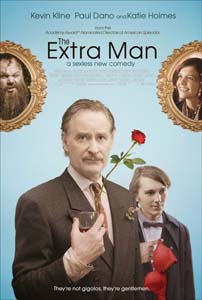
THE EXTRA MAN
US, 2010, 105 minutes, Colour.
Kevin Kline, Paul Dano, John C. Reilly, Katie Holmes, Dan Hedaya, Patti D' Arbanville, Celia Weston, John Pankow, Marian Seldes.
Directed by Shari Springer Berman, Robert Pulcini.
Idiosyncratically droll.
That is a reviewer’s word choice to indicate the tone and style of this film about a group of eccentrics who aspire to and live the high life of New York society (and holidaying in Florida). The film is more amusing than funny (though there are some good laugh sequences and one-liners), a comedy of manners, both good and bad manners, and relies on its off-kilter characters and the strong performances to communicate this oddball world.
As the film opens with a Gatsby-like mansion, we find our anti-hero, Louis Ives, imagining himself as Jay Gatsby only to find that he is Daisy as well. This leads to a theme where he thinks he is a woman and is into cross-dressing with the help of some S and M mistresses, though avoiding any sadism or masochism. He is played by the young, ganglingly awkward actor, Paul Dano, so impressive and different in Little Miss Sunshine and the villain in There Will be Blood. A would-be writer who works for a Green magazine, we follow his Candide–like adventures in New York.
While he is the main character, the spotlight falls on Henry Harrison, played by Kevin Kline as a waspish dandy, a ‘walker’ for elderly grandes dames who need an escort for social functions or, simply, for an elegant afternoon tea outing. He accepts Louis as a boarder and, after getting accustomed to his odd behavior and comments, Louis begins to ape his mentor. Kevin Kline is given many witty lines, rather misanthropic and conservative-sounding, and he delivers them with relish and panache.
One neighbour is a hirsute John C. Reilley who, when he finally speaks, is trapped in a falsetto register (except when he sings Somewhere My Love). In the cast are Katy Holmes as Louis’s co-worker at an environmental magazine, Celia Weston as a society follower who imposes herself on functions and Marian Seldes as the grande dame of all grandes dames.
The film may not appeal right across the board with its characters trying to live an F. Scott Fitzgerald life in the 21st century and their wry humour. But, for those who appreciate something a little different and touches of wit and irony, this will be quite a pleasure.
1. A comedy of manners, a comedy of eccentricity?
2. The droll humour, ironic, satiric?
3. New York City, the contrasts between the wealthy and society and ordinary apartments and the poor? A blend of the real, unreal, the surreal?
4. The introductory tone, The Great Gatsby, Louis and the voice-over, the car, Daisy arriving, Louis being Gatsby, the image, his being Daisy as well? Indication of themes, identity? His voice-over?
5. Louis and his classes, writing, his hopes, tripping over the case, the bra, the principal catching him, the nature of the interview, the indication of a reference or not giving it, his future?
6. Louis in New York, poor, his continued hopes, the notice, the phone number, ringing Henry, the eccentric phone call, his arrival? Meeting Gershon, his appearance, not talking? Louis and his awkwardness, talking with Henry, the conditions of staying, his decision after thinking it over, Henry urging him to move in? The small bed, the toilet, the dance exercises and Henry’s behaviour?
7. Kevin Kline as Henry, the title of the film, his explanation, his manner, age, style, waspish, the one-liners, conservative, the influence of his understanding of Catholicism? The previous boarder and stealing his play? His friendship with Gershon, their clash, Gershon not talking? His life, hopes, his life in New York and in Florida?
8. Instructing Louis, the women, their lives, adapting to them? The outings, the meeting with Meredith and the clashes with her?
9. Meredith, dressing up, the guests, the dinners, her talk, insults, her grudges?
10. Paul, getting the job at the magazine, the interview with the boss, his being hired, the phone sales and his not working well with them? The meeting with Mary, the attraction, stealing the nightie? The date with her, returning the nightie? Not following her?
11. His seeing the sex advertisements, the cross-dressing, the episodes and going to Katherine? The reassurance? With the sadomasochistic mistress, the nightie, his appearance, the makeup, his disillusionment, Henry catching him? His return, Henry and the rules?
12. His meeting with Vivian Cudlip? Her reputation, Henry’s explanations? Louis charming her, adapting to her, escorting her, the tea, the dinner, the Russian restaurant? Escorting her home?
13. Vivan Cudlip as the grande dame, her expectations, symbolising the society women? The need for a companion, the nature of the Walker?
14. The Swiss friend, his visit, collecting his mail from the freezer, the issue of the play, Louis seeing the clips? The marriage? The Swiss playwright and his ambitions, marrying the older woman? The suggestion that Louis follow this example?
15. Henry and Gershon, fixing cars, the bike? Gershon finally talking? The importance of the walk along the beach? Gershon and his voice, singing Somewhere My Love? Cutting his hair, his quite difference appearance?
16. Henry and his future? Louis and his future – and his attempts to find himself?